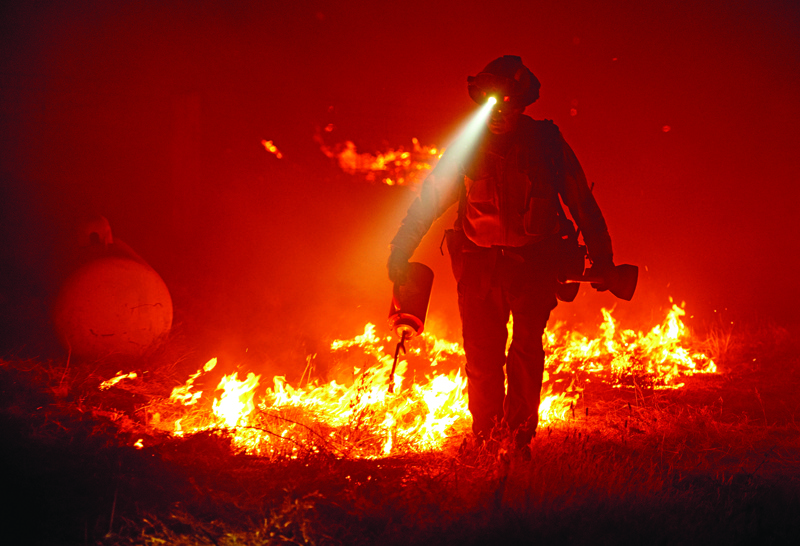
CLOVIS, US: Entire communities have been razed by wildfires raging in the western United States, with officials warning of potential mass deaths under apocalyptic orange skies. At least six people were confirmed dead by late Wednesday, with officials warning that more deaths would likely be reported in the coming days as many areas were currently impossible to reach.
Five towns were "substantially destroyed" as widespread evacuations took place across the northwestern state of Oregon, governor Kate Brown said. "This could be the greatest loss of human lives and property due to wildfire in our state's history," she told a press conference.
It is not the first time that Leanna Mikesler has evacuated her home in the California mountains because of wildfires, but during an epidemic it is "10 times harder." Mikesler and her husband fled with only their most important documents, and, as she walks her dog at an emergency Red Cross facility in Clovis in the center of the state, she says she fears their property may be destroyed.
"The fire is right around it," she says of her home in Meadow Lakes, in the Sierra National Forest where the Creek fire is raging. "They call… the evacuation. And then you go from there to see if your house has been burned down," Mikesler says slowly, adding she has seen aerial images of firefighters battling to save her small community with water bombers.
Since the authorities notified them on Saturday through loudspeakers to evacuate, the couple has been living in a subsidized hotel room because the usual emergency facility-a gymnasium filled with hundreds of beds-is not an option during the Covid-19 crisis.
The Red Cross has provided meals for evacuees sheltering in the hotels. Cindy Huge, a spokeswoman for the aid charity based in a local high school, said: "There's over 600 people… and food has been delivered to them in disposable containers, three meals a day and snacks and water."
Another evacuee, 69-year-old David Mascarini, told AFP he fled his home with his wife and dog, and after spending one night in a hotel he had to approach the Red Cross because there were no more rooms available. Two deaths were confirmed in the Santiam Canyon region, 60 miles south of Portland, and Marion County sheriff Joe Kast warned the death toll would likely rise further. Only "smoldering ruins" remained of large parts of the town of Talent, local resiident Sandra Spelliscy said.
"There are numerous neighborhoods where there are no structures left standing… dozens of homes (gone) and literally nothing except the skeletons of a chimney or an appliance," she said. Emergency officials ordered the evacuation of Estacada-a small, rural city 30 miles southeast of Portland. Jason Valean, 29, fled his house on foot with his two large dogs and was nervously waiting in the central downtown area for his mother.
"She wanted to keep the dogs in their pen, but I wasn't going to let her," he said, adding she had released their pigs in the hope they would have a chance of getting away safely. Another resident said she was planning to stay despite the evacuation order because she worried about looting, although her husband was leaving with their son and granddaughter.
'10 times harder'
Neighboring California and Washington states have also been scrambling to contain the rapidly spreading wildfires since the weekend due to unprecedented heatwaves followed by intense, dry winds. Wednesday's fatalities included a one-year-old baby boy who perished while his parents suffered severe burns as they attempted to flee an inferno 130 miles east of Seattle, in Washington state.
Three unidentified people were also killed in northern California. Leanna Mikesler, from Clovis in the state's center, told AFP she had been forced to evacuate her home to escape wildfires before, but it was "10 times harder" during the pandemic. "They call… the evacuation. And then you go from there to see if your house has been burned down," she said. People in the San Francisco Bay Area awoke to a deep orange sky caused by wildfire smoke that at times blocked out sunlight entirely.
Photos of the eerie scene, particularly of a San Francisco skyline fit for a dystopian science fiction film, spread quickly on social media. "We know the smoke, darkness, and orange glow is scary. Stay calm and try to stay indoors," tweeted the fire department. Much of the smoke blew down from the north, where the Bear Fire exploded at an unprecedented speed overnight, combining with older blazes to scorch over 250,000 acres and threaten the town of Oroville.
Evacuation warnings were expanded to parts of the town of Paradise, the site of California's deadliest modern fire which killed 86 people less than two years ago. The nearby August Complex Fire also spread rapidly to become the state's second-largest blaze in history, at 420,000 acres. -- AFP









